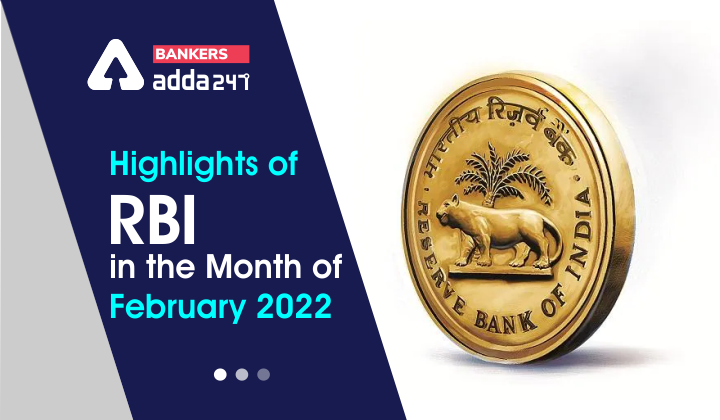1. ‘Sectoral Deployment of Bank Credit – December 2021’- data about loan growth in various sectors.
-
- The bank’s non-food credit registered a growth of 9.3 percent (on a year-on-year (y-o-y) basis) in December 2021 as compared to 6.6 percent in December 2020.
- Growth seen in sectors– all engineering, chemicals & chemical products, infrastructure, mining & quarrying, petroleum, coal product & nuclear fuels, textiles and wood & wood products, etc
- Contraction seen in sectors– basic metal & metal products, cement & cement products, construction, food processing, glass & glassware, paper & paper products
- Housing remained the prime driver of overall growth in the personal loans segment
2. For smoothening the liability profile and market development, the Government of India (GOI) has done a conversion switch transaction of its securities with the RBI on January 28, 2022, for an amount of Rs. 1,19,701 crore (face value).
3. The overseas borrowings of Indian companies stood at USD 23.28 billion in the first 3 quarters of the FY22 (April 2021 -December 2021) as against USD 19.53 billion during FY21 (April December 2020) and had jumped over 19 percent in the first nine months of the current fiscal (9MFY22) as per the Reserve Bank of India (RBI).
-
- Overseas borrowing means External Commercial Borrowing
- An external commercial borrowing (ECB) refers to the loans taken from non-resident lenders i.e. the foreign companies with a minimum average maturity (3 years) which can be availed through the automatic or the approval route.
- ECBs include commercial bank loans, buyers’ credit, suppliers’ credit, securitized instruments such as floating rate notes and fixed-rate bonds, etc.
4. RBI extended the deadline for non-banking financial companies (NBFCs) to comply with new Non-Performing Assets (NPAs) classification norms to September 2022 from the earlier deadline of March 2022.
: As per the ‘Prudential norms on Income Recognition, Asset Classification and Provisioning pertaining to Advances – Clarifications’, which was issued by RBI on November 15, 2021, the loan accounts that are classified as NPAs could be upgraded as ‘standard’ asset only if entire arrears of interest and principal are paid by the borrower.
5. As per the Goldhub, RBI has emerged as the 2nd largest buyer of Gold among the world’s Central Banks in 2021.
-
- Goldhub is an official website of the World Gold Council that maintains all the data regarding precious metal
- As per Goldhub, India has the 9th largest official gold reserves in the world.
- Central Bank of Thailand is the largest buyer in 2021 that buying 90 metric tonnes of gold
6. RBI directed certain Non-Banking Financial Companies (NBFCs) to mandatorily implement ‘Core Financial Services Solution (CFSS)’ by 30th September 2025.
-
- In October 2021, RBI introduced the ‘Scale Based Regulation’ (SBR) framework for NBFCs which mandated NBFCs with 10 and more branches to adopt Core Banking Solution with effect from October 01, 2022.
- Special Timeline for NBFC-Upper Layer: NBFC – Upper Layer should implement CFSS at least in 70 percent of ‘fixed point service delivery units’ on or before September 30, 2024.
- The implementation of CFSS is not mandatory in NBFC – Base Layer
7. e-RUPI(Prepaid digital Vouchers using UPI)– launched in August 2021 to strengthen the Direct Benefit Transfer (DBT) and the financial inclusion of unbanked citizens
-
- the ‘person and purpose-specific’ one-time cashless and contactless voucher-based prepaid electronic digital payment solution was developed by the National Payments Corporation of India (NPCI) and run on its UPI (Unified Payments Interface) platform
- Changes: RBI has proposed to increase the limit on the amount for e-RUPI vouchers issued by Governments to Rs 1 lakh per voucher from 10000 and allow the use of the voucher multiple times until the amount of the voucher is completely redeemed
8. Trade Receivables Discounting System (TReDS), which facilitates discounting / financing of receivables of MSMEs, was launched by the RBI to support the Micro, Small and Medium Enterprises (MSMEs) sector.
-
- TReDS settlements are carried out through National Automated Clearing House (NACH) system. Currently, the amount of the NACH mandate is capped at Rs 1 crore.
- Current Extension: RBI has proposed to increase the National Automated Clearing House (NACH) mandate limit for settlements related to the invoice discounting mechanism for MSMEs through TReDS to Rs 3 crore from Rs 1 crore to enhance the ease of financing and the growing liquidity requirements of MSMEs.
9. Extension of Term Liquidity Facility of Rs 50,000 crore till June 30, 2022. The facility was offered in May 2021 to emergency health services.
10. RBI has increased the investment limit under the Voluntary Retention Route (VRR) for foreign portfolio investors (FPIs) from 1.5 lakh crore to Rs 2.50 lakh crore (increased by Rs 1 lakh crore) with effect from April 1, 2022
11. Other notifications-
- RBI cancels CoR of PC Financial Services operating ‘Cashbean’ app
- RBI canceled the license of Mantha Urban Cooperative Bank Ltd., Mantha, District Jalna, Maharashtra
- RBI extended the restrictions on Millath Co-Operative Bank, Devangere (Karnataka) by another three months.



 GA Capsule for SBI Clerk Mains 2025, Dow...
GA Capsule for SBI Clerk Mains 2025, Dow...
 The Hindu Review October 2022: Download ...
The Hindu Review October 2022: Download ...
 Bank Exams 2025, Check Full List of Upco...
Bank Exams 2025, Check Full List of Upco...


